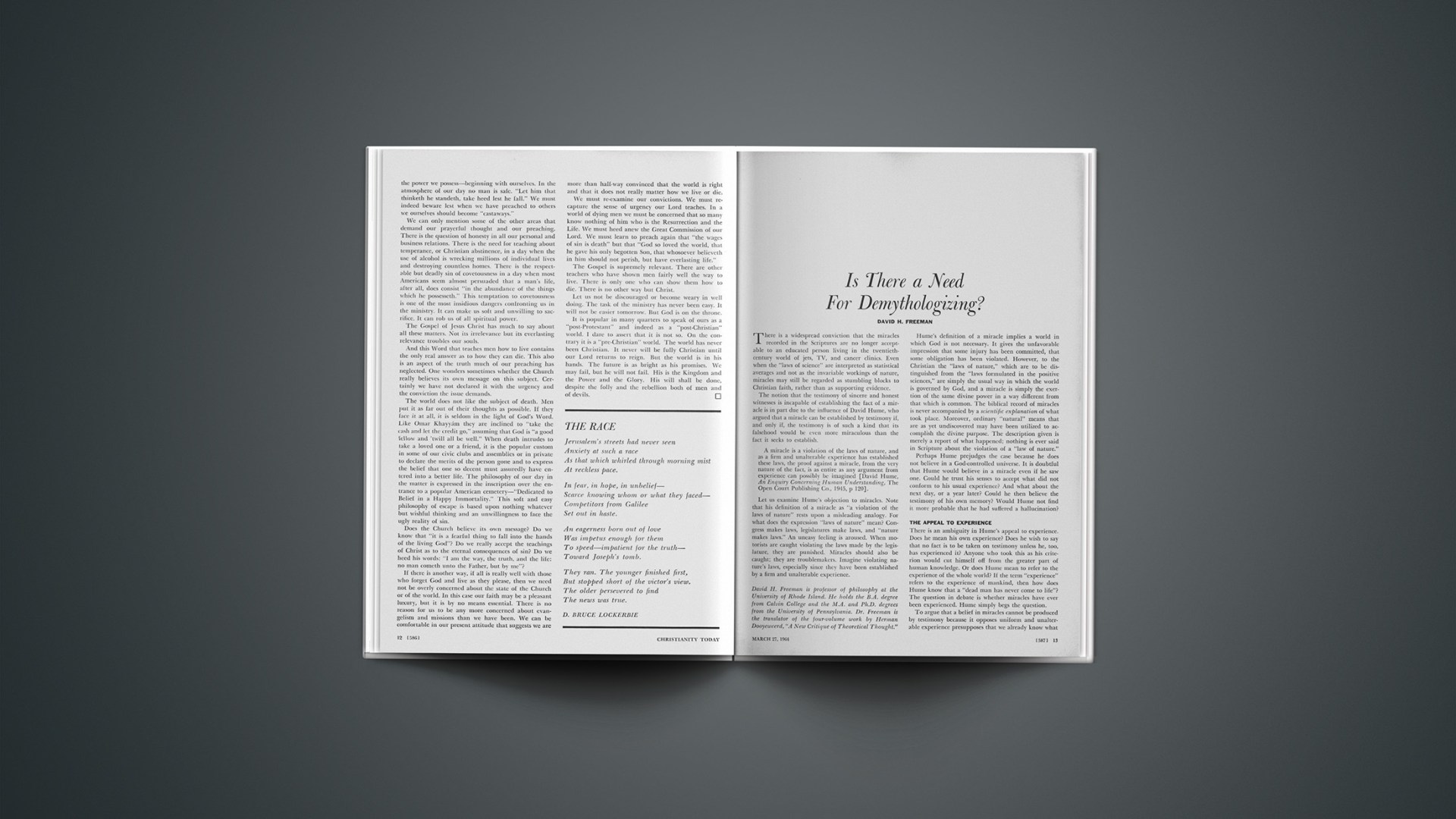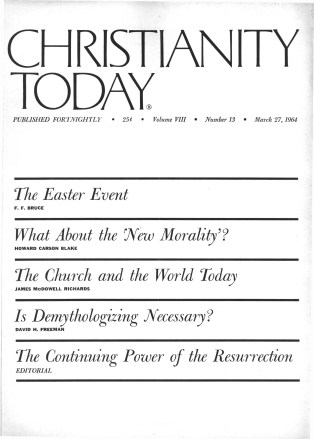There is a widespread conviction that the miracles recorded in the Scriptures are no longer acceptable to an educated person living in the twentieth-century world of jets, TV, and cancer clinics. Even when the “laws of science” are interpreted as statistical averages and not as the invariable workings of nature, miracles may still be regarded as stumbling blocks to Christian faith, rather than as supporting evidence.
The notion that the testimony of sincere and honest witnesses is incapable of establishing the fact of a miracle is in part due to the influence of David Hume, who argued that a miracle can be established by testimony if, and only if, the testimony is of such a kind that its falsehood would be even more miraculous than the fact it seeks to establish.
A miracle is a violation of the laws of nature, and as a firm and unalterable experience has established these laws, the proof against a miracle, from the very nature of the fact, is as entire as any argument from experience can possibly be imagined [David Hume, An Enquiry Concerning Human Understanding, The Open Court Publishing Co., 1945, p 120].
Let us examine Hume’s objection to miracles. Note that his definition of a miracle as “a violation of the laws of nature” rests upon a misleading analogy. For what does the expression “laws of nature” mean? Congress makes laws, legislatures make laws, and “nature makes laws.” An uneasy feeling is aroused. When motorists are caught violating the laws made by the legislature, they are punished. Miracles should also be caught; they are troublemakers. Imagine violating nature’s laws, especially since they have been established by a firm and unalterable experience.
Hume’s definition of a miracle implies a world in which God is not necessary. It gives the unfavorable impression that some injury has been committed, that some obligation has been violated. However, to the Christian the “laws of nature,” which are to be distinguished from the “laws formulated in the positive sciences,” are simply the usual way in which the world is governed by God, and a miracle is simply the exertion of the same divine power in a way different from that which is common. The biblical record of miracles is never accompanied by a scientific explanation of what took place. Moreover, ordinary “natural” means that are as yet undiscovered may have been utilized to accomplish the divine purpose. The description given is merely a report of what happened; nothing is ever said in Scripture about the violation of a “law of nature.”
Perhaps Hume prejudges the case because he does not believe in a God-controlled universe. It is doubtful that Hume would believe in a miracle even if he saw one. Could he trust his senses to accept what did not conform to his usual experience? And what about the next day, or a year later? Could he then believe the testimony of his own memory? Would Hume not find it more probable that he had suffered a hallucination?
The Appeal To Experience
There is an ambiguity in Hume’s appeal to experience. Does he mean his own experience? Does he wish to say that no fact is to be taken on testimony unless he, too, has experienced it? Anyone who took this as his criterion would cut himself off from the greater part of human knowledge. Or does Hume mean to refer to the experience of the whole world? If the term “experience” refers to the experience of mankind, then how does Hume know that a “dead man has never come to life”? The question in debate is whether miracles have ever been experienced. Hume simply begs the question.
To argue that a belief in miracles cannot be produced by testimony because it opposes uniform and unalterable experience presupposes that we already know what universal experience is. But apart from our own personal experience, we know what others experience (universal experience) by testimony. To destroy the testimony in favor of miracles, Hume must in fact appeal to testimony. For otherwise he would not know what “universal experience” is.
When Hume is confronted with testimony that a particular “miracle” occurred, he does not produce witnesses who testify that this particular miracle did not occur. He simply introduces witnesses who testify that they never saw anything like the miracle in question.
Hume pretends to consider the probability of miracles when he has assumed the impossibility of miracles. If there is any probability of an event, then one must allow for its possibility; whereas Hume rules out the possibility that miracles can be established by testimony and yet still talks about their probability.
The evidence of testimony admits of conceivable degrees. However, the degree of certainty of a conviction does not necessarily depend upon the number of witnesses. Several reliable witnesses who agree and are uncontradicted by other evidence are frequently sufficient. To disbelieve in the veracity of certain witnesses is to believe in their untruthfulness. A person who never considers objections to the other side of an issue often appears to have a strong case. Even the most firmly established facts of history can be made to appear highly improbable, if objections are introduced without allowing for any consideration of the evidence for the opposite view.
The person who objects to Christianity frequently ignores the difficulties involved in accepting the consequences of his own position. To deny the evidence for Christianity and to deny that miracles ever occurred necessitates that the existence of the Christian Church be explained on other principles.
Thirty years after the death of Christ there were many Christians in Rome who were willing to die for their faith in what the Gospels teach. The writings of the apostles were accepted as authoritative by the early Christians; they contain numerous references to the geography of Judea, to the manners and customs of the Jews; and although their words are Greek, their idiom is Syro-Chaldaic, the vernacular of Judea at the time of Christ and the apostles.
Not only is it an established fact that the books of the New Testament are the genuine production of the apostles and contain their testimony to the miracles described; it is also true that these books have not undergone any material change since they were written, as is evident from the general agreement of many copies, versions, and quotations from other sources.
The authenticity of the New Testament documents does not in itself establish the credibility of their testimony. Many events described are miraculous—the raising of the dead and healing of the sick, the feeding of thousands with a few loaves and fishes, the resurrection of Jesus three days after he had been crucified.
The apostles could not have repeatedly suffered illusions. For the most part the miracles were performed in public, under the observation of learned, intelligent enemies, in a variety of circumstances, and for several successive years. The miracles performed are characterized by dignity, propriety, and kindness, not by ostentation, and were not performed for personal gain. There is every indication that the writers claimed to be truthful and honest. What they relate is set forth as the unadulterated truth; they do not seek to magnify themselves, nor do they show any sign of evil purpose.
Truth Or A Fraud
Either the historical accounts given by the writers of the New Testament are true or they are false. If they are false, is there any alternative other than to hold that the record is an intentional fraud, the product of premeditated deceit? And then, what motive could the gospel writers have had for their willful intention to perpetrate a fraud upon the world? What caused these men to embark upon a dangerous enterprise, to provoke the fury of mobs, and the wrath of civil and religious authorities? Their leader was executed. Why did they say he was miraculously alive and had performed miracles? Why were they willing to be persecuted for what they knew to be a lie? Did they expect to become famous by proclaiming a lie? If so, why did they not point to themselves? Were they simply enthusiastic fanatics? Do their writings appear to have been written in a frenzy? Suppose, even, that they were motivated by some unknown reasons. How could they gain adherents in the very country and city where the miracles were said to have been performed, among those in a position to know whether what they said was true? Only a few weeks after the death of Jesus their testimony was received as true, and multitudes became disciples.
The conclusion that the Christian reaches by such considerations is that the testimony for the miracles of the New Testament renders them credible to an intelligent person living in the twentieth century. The Christian does not believe that the New Testament needs to be demythologized,” simply because it does not contain myths, or cunningly devised fables, but is rather a declaration of those things that are most surely believed by those who were from the beginning eyewitnesses and ministers of the Word.
The discoveries of modern science, the advances in technology, and the arguments of the philosophers are simply irrelevant to the question of miracles. An acceptance of the biblical record rests upon the unalterable conviction that the world is God’s world; its laws are God’s laws. A person is not a Christian simply because he believes in miracles; rather, he believes in miracles because he is a Christian, i.e., because God has performed a mighty work within his heart and has called him according to His eternal purpose. The Christian in the modern world is not separated from the love of Christ by tribulation, persecution, or the cavils of philosophers. The Gospel remains foolishness to the Greeks, but the foolishness of God is wiser than men. And to those who are called, both ancients and moderns, Christ is the power and the wisdom of God.
David H. Freeman is professor of philosophy at the University of Rhode Island. He holds the B.A. degree from Calvin College and the M.A. and Ph.D. degrees from the University of Pennsylvania. Dr. Freeman is the translator of the four-volume work by Herman Dooyeweerd, “A New Critique of Theoretical Thought.”










